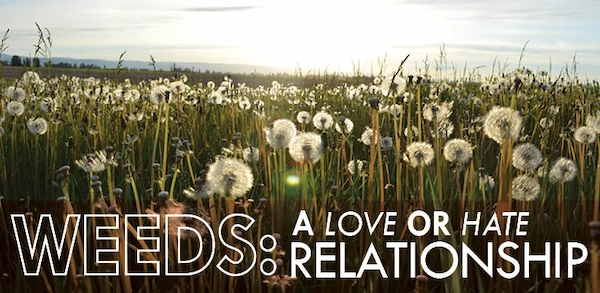Weeds: A Love-Hate Relationship

When it comes to keeping your garden tidy, it often seems as though you’re fighting a constant battle with weeds. These crafty plants often do more harm than good, but not always. In the love hate relationship you maintain with weeds, consider which ones can actually benefit your garden and the varieties you want to keep out at all costs.
Weeds You Love
- Clover: This is one of the most beautiful weeds to keep in your garden. It has lush purple flowers, feels soft underfoot and protects the soil. With nitrogen-fixing bacteria in its roots, clover is able to reintroduce nitrogen to depleted soil. Clover is a great companion plant for cabbage, broccoli, cauliflower, corn, gourds, melons and squash.
- Dandelion: While this ubiquitous plant may make you shudder if you’re hoping for a weed-free lawn, dandelions are a fundamental part of childhood. However, aside from providing amusement for children as they blow the seeds from puffy dandelions into the air, this weed has other surprising benefits. You can stick young leaves and flowers in a fresh salad or steep leaves and roots for a detoxifying tea.
- Ground ivy: This weed is perfect for providing soft, green groundcover for an otherwise barren patch of dirt. It’s even known to deter cabbage worms, beetles and other harmful insects when planted with broccoli, Brussels sprouts, cauliflower, melons, peppers, tomatoes and squash.
- Wild vetch: The beautiful purple flowers of the wild vetch are a joy to look at, but that’s far from the only benefit this weed provides. Let it grow near broccoli, mustard, peppers, tomatoes and other plants that flourish in high nitrogen soil. Just be aware that wild vetch can grow quite tall, so let it flourish between crops, not right on top of them.
- Plantain: If you’re interested in natural medicine, plantain is an important weed to familiarize yourself with. You can steam the leaves or eat them fresh in a salad. You can also brew them in a tea to treat everything from hemorrhoids to mouth ulcers to varicose veins.
Weeds You Hate
- Thistle: Spiny leaves and noxious effects if eaten make thistle a very undesirable weed. An expanding network of roots allows thistle to spread through the garden. Once established, it can be very difficult to control this weed. If left to grow freely, it will reach 1/2 to 1 metre tall.
- Prostrate spurge: This weed is commonly found in newly established lawns or thinning grass. It thrives in harsh, sun-baked conditions and compact soil. This vigorous plant can grow up to 1 metre in diameter.
- Foxglove: While beautiful to look at, foxglove is a poisonous weed you don’t want in your garden. Eating it can cause nausea, vomiting, diarrhea, stomach cramps and pain in the mouth.
- Lily of the valley: The flowers of this weed are sweetly scented, but don’t let them fool you. As another deceptive beauty, lily of the valley is poisonous from the tips of its tiny white flowers to its roots. Eating a little of this plant might not cause too much harm, but ingesting too much can cause the same unpleasant symptoms as foxglove.
- Stinging nettle: While this weed can be steamed, blanched or dried and taken as an herbal remedy, the nasty burning, itching rash you get from brushing up against it makes stinging nettle an unpleasant addition in any garden.
Weed Control Services
If you find you have more pesky weeds than helpful ones, contact The Grounds Guys. We can eliminate all common weed types to protect your lawn and garden, as well as implement tactics to prevent future growth.
 Click to call
Click to call


